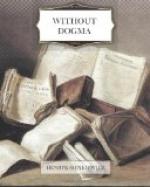There is, too, a background against which these pictures paint themselves, and it reminds us not a little of Verestchagin,—the same deep feeling for nature, and a certain sadness that seems inseparable from the Russian and Lithuanian temperaments, tears following closely upon mirth. At times, after incident upon incident of war, the reader is tempted to exclaim, “Something too much of this!” Yet nowhere, perhaps, except from the great canvases of Verestchagin, has there ever come a more awful, powerful plea for peace than from the pages of “Fire and Sword.”
In “Without Dogma” is presented quite another theme, treated in a fashion strikingly different. In the historical novels the stage is crowded with personages. In “Without Dogma,” the chief interest centres in a single character. This is not a battle between contending armies, but the greater conflict that goes on in silence,—the battle of a man for his own soul.
He can scarcely be considered an heroic character; he is to some extent the creature of circumstances, the fine product of a highly complex culture and civilization. He regards himself as a nineteenth-century Hamlet, and for him not merely the times, but his race and all mankind, are out of joint. He is not especially Polish save by birth; he is as little at home in Paris or at Rome as in Warsaw. Set him down in any quarter of the globe and he would be equally out of place. He folds the mantle of his pessimism about him. Life has interested him purely as a spectacle, in which he plays no part save a purely passive one. His relation to life is that of the Greek chorus, passing across the stage, crying “Woe, woe!”
Life has interested, entertained, and sometimes wearied him. He muses, philosophizes, utters the most profound observations upon life, art, and the mystery of things. He puts mankind and himself upon the dissecting-table.
Here is a nature so sensitive that it photographs every impression, an artistic temperament, a highly endowed organism; yet it produces nothing. The secret of this unproductiveness lies perhaps in a certain tendency to analyze and philosophize away every strong emotion that should lead to action. Here is a man in possession of two distinct selves,—the one emotional, active; the other eternally occupied in self-contemplation, judgment, and criticism. The one paralyzes the other. He defines himself as “a genius without a portfolio,” just as there are certain ministers-of-state without portfolios.
In such a character many of us will find just enough of ourselves to make its weaknesses distasteful to us. We resent, just because we recognize the truth of the picture. Leon Ploszowski belongs unmistakably to our own times. His doubts and his dilettanteism are our own. His fine aesthetic sense, his pessimism, his self-probings, his weariness, his overstrung nerves, his whole philosophy of negation,—these are qualities belonging to this century, the outcome of our own age and culture.




